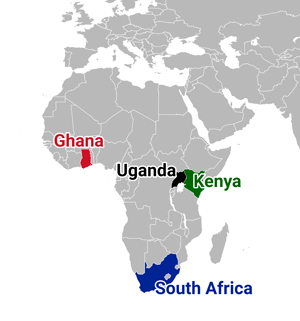SMART Africa Project (Strengthening Mental Health and Research Training in Africa)

Leadership
Contact Principal Investigator: Mary McKay, Ph.D.
Principal Investigator: Kimberly Hoagwood, Ph.D.
Hub Activity Sites
Uganda
Ghana
Kenya
South Africa
United States
Project Overview
SMART Africa (Strengthening Mental Health and Research Training in Africa) Project is a transdisciplinary collaborative partnership to engage stakeholders from academia, government, non-governmental organizations (NGOs), and local communities in Uganda, Ghana, Kenya, and South Africa in addressing child mental health burden, evidence-based intervention implementation, scale-up, service gaps. A scale-up implementation study is being conducted in Uganda. Smaller-scale studies will take place in Ghana and Kenya as part of the capacity-building component. Capacity-building activities are taking place in all three countries with support from the South Africa and U.S. based teams.
Implementation Research Study
The implementation research studies are designed to compare two different approaches for delivering a multiple family group intervention for children experiencing disruptive behavior challenges. The two different delivery approaches are multiple family group facilitation by family peers versus community outreach health workers. The aims of the studies are: 1) to examine the uptake, implementation, and fidelity of the two delivery approaches; 2) to identify multi-level factors that influence uptake, implementation, and integration of the multi-family group intervention and youth outcomes; 3) to identify community level supports, including trust, encouragement of participation; and 4) to assess short- and longer-term child outcomes.
Research Capacity Building
The capacity-building activities involve two phases. Phase I activities are similar across countries; they build a foundation for the collaborative approach to implementation research. During Phase I, webinars and workshops aim to build the knowledge and skills of policymakers and NGO staff to strengthen partnerships and apply science to policy and program development. Workshops will also enhance researchers’ knowledge and skills in applying current science frameworks to conducting implementation research. Phase II focuses on technical support for the individual needs of each country and each research study. In Phase II, the project collaborates with in-country investigators to mentor new and early stage investigators and to engage senior investigators in supporting high quality implementation research projects by these new and early stage investigators to enhance the public health value of the collaborative work.
Project website: SMART Africa Center
